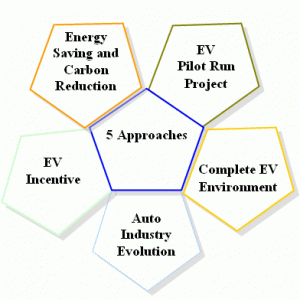
Chinese Taipei has been working hard to promote the Intelligent Electric Vehicle Industry. In April 2010, Chinese Taipei promulgated the “Intelligent Electric Vehicle Development Strategies and Action Plans,” aimed at enhancing this industry through 5 approaches: setting up Energy saving and Carbon Reduction regulation; performing Pilot Run Project; giving EV purchase incentive; setting up infrastructure; and enhancing Industry Evolution. The total budget for the program will be US$300m.
In the first stage (2011~2013), the government will subsidize and run 3,000 units of electric vehicles on roadways under 10 pilot projects, combining with the Government owned enterprises, CPC and Tai Power Company, to figure out suitable business models for EVs in Chinese Taipei. Aside from these pilot projects, infrastructure like AC charging station, DC charging stations, battery rental and even battery swap stations will all be considered. Some government offices and government owned enterprises will begin using 185 EVs as their vehicles in the coming 3 years. An estimated greater than 500 EVs are scheduled to be out on roads before the end of 2012.
By the June, 2012, 3 pilot projects had passed 2 stages of investigations. Also, two projects had passed the first stage investigation and 5 mature projects are under discussion for implementation. Not only local brand EVs, such as Luxgen and Tobe, are involved in the pilot run, but Nissan, Mitsubishi, and Toyota will also launch their EVs in Chinese Taipei and are seeking the possibility for cooperation with Taiwan suppliers.
Regarding charging stations, the technical standards for charging station Installation, Interface, and Safety have been transferred to national standard (CNS). When it comes to installing charging stations, CPC will set up 60 fast charging stations island-wide after the DC charging interface is confirmed. Local Government or enterprises who participate in the pilot projects will also contribute by installing charging stations. For example, the 2 projects which passed two stage investigations will set up 261 charging stations in the Taipei City area and the Taichung City region for EV operation. Then we will link the 10 projects’ infrastructure together and gradually establish the EV charging system around the whole island.
During the second stage (2014 – 2016), based on the availability of financing, Chinese Taipei will offer subsidies for consumers who purchase EVs.
Another incentive also factor into the Intelligent Electric Vehicle Development Strategies and Action Plans. Chinese Taipei passed the regulation of commodity tax exemption for EVs in 2011. The tax exemption will be phased in during a 3 year period, beginning Jan 28 2011, resulting in a complete exemption from commodity tax for EVs, which was originally 25% . The 3-year licensing-free policy was also announced for EVs. These incentive and policies are not only to encourage the industry to R&D, but also to drive industry development.